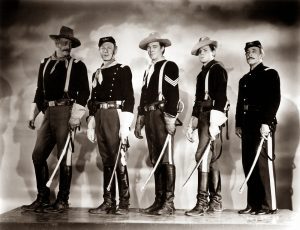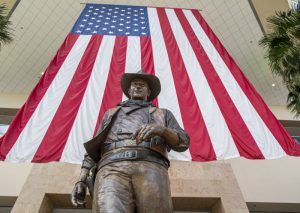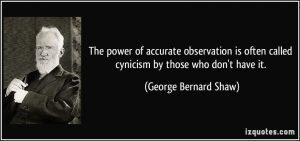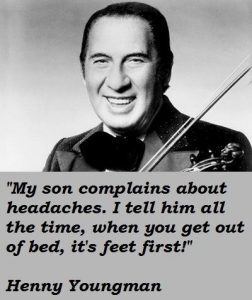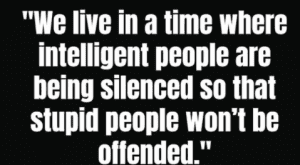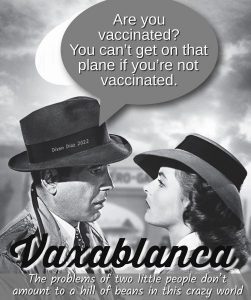Ronald E. Yates's Blog, page 42
February 8, 2022
The Chrysalis: Wake Up America
BY
A concerned and worried proud American
Do you remember your grade school science class when we learned about ‘transformation’?
One day, the caterpillar stops eating, hangs upside down from a twig or leaf, and spins itself a silky cocoon or molts into a shiny chrysalis. Within its protective casing, the caterpillar ‘radically’ transforms its body, eventually emerging as a butterfly or moth.
I stress the word ‘radically’ within this narrative. As it relates to the caterpillar and the resulting chrysalis that was formed, the change was, indeed, radical; however, what emerged was something of beauty by nature…it was either a moth or, more colorfully, a very lovely fluttering butterfly. We watched in wonder, and the change was a mystery of life.
It is indeed a stunning ‘transformation,’ which still holds our wonder, and we delight at this change, this metamorphosis.
Today, there is another metamorphosis emerging. We are witnessing another attempt by nefarious, well funded, socialist-leaning, and inspired, anarchist groups who want to radically transform our country, our government, our very way of life and liberty.
Only, this attempted transformation will not yield or turn into anything of beauty and natural amazement. What it will generate is an ugly, socialistic ‘utopia’ where individual expression and achievement are not only not applauded, but not allowed to exist.
If not curtailed, and even though perpetrated by a few [relative to the population], radical, disgusting individuals, this dangerous movement can only increase and sow further destruction of property and create a further loss of life.
Regrettably, the apparent sympathy for this movement and actual condoning of this vile, destructive group and the damage wrought, by the primarily left-leaning, elected ‘democratic’ [quite an oxymoron] officials, further emboldens this movement and, by their acquiescence, quietly provides an invitation for the continuation of these destructive actions.
A no-bail policy, lack of support and removal of funding for our valiant police forces, a repudiation of our history from whence we originated and developed as a nation, the seeming disregard for our constitutional amendments that are supposed to guarantee free, protected speech, the right to carry firearms and protect oneself….all of these are the fundamentals to the foundation of our country and our beliefs.
It is so apparent that, because the results of the last presidential election was (and still is) disputed, there has been such divisiveness sown and promulgated by the current ‘democratic’ party, and the attempted, ugly transformation occurring before us has been allowed and sanctioned. It is indeed so sad and pathetic that many of our elected individuals do not have the best interests of America in their hearts…what they have is bitterness and loathing for the rule of law and our way of life.
Our country has always undergone ‘transformation’ over time; it has continually morphed as necessary. However, any changes that did occur did not call for the destruction and abolition of our fundamental core beliefs. There was never such blatant disregard for our constitution, our values, yes, our capitalistic, entrepreneurial way of life that promoted and honored achievement regardless of where one originated by birth or life circumstance.
So, are we to continue to allow this attempted ‘transformation’ to continue?
Each citizen has to decide how this country will emerge from its chrysalis. Hopefully, in the interim, actions will be taken by the current administration to restrain/curtail these heinous actions and the damage that has been imposed on several of our cities, jeopardizing the lives of millions of our citizens.
Even if we must sadly endure additional civil strife and lawlessness at the hands of these perpetrators and further sanctioned and condoned by some very weak, arrogant, ill-meaning officials and, let us not forget, the mainstream media’s failure to call out these individuals and groups, for they will not do so. We must ensure that in the November 2022 midterm elections we reject the socialists and communists in favor of those who will guarantee our American values and ideals. We must vote for those who will provide a positive ‘transformation’ and reaffirmation of American exceptionalism and liberty.
February 7, 2022
Is John Wayne a Racist Symbol?
The post below was one I published a couple of years ago about John Wayne. At the time, some on the left and the nation’s race-baiters were suggesting that John Wayne might have been a racist–or at least a symbol of “white supremacy,” whatever that is. Here is that post.
I wrote John Wayne’s obituary for the Chicago Tribune in 1979. At the time, I was the newspaper’s West Coast Bureau Chief, and the “Duke” had just passed away at age 72 from stomach cancer.
It was a tough obit to write. I had grown up on John Wayne movies—especially classics like 1956’s “The Searchers,” and director John Ford’s iconic “cavalry trilogy” (“Fort Apache,” “She Wore a Yellow Ribbon,” and “Rio Grande”).
There are so many unforgettable Wayne films that I can name from the 200 or so he made. There is 1948’s “Red River” about the first cattle drive from Texas to Kansas along the Chisholm Trail. There was 1949’s “The Sands of Iwo Jima” in which he plays tough and demanding Sergeant John M. Stryker, and there is 1952’s “The Quiet Man,” in which he plays an Irish-born American and former heavyweight boxer who travels to Ireland in the 1920s to buy his family’s old farm.
And of course, there is 1969’s “True Grit,” Wayne’s only Oscar-winning performance as the cantankerous lawman Rooster Cogburn.
His last film, 1976’s “The Shootist,” was a poignant and prophetic look at an aging gunfighter named John Books who is dying of cancer. I still can’t look at that film without getting a lump in my throat.
Along with my father, John Wayne was a man I wanted to model myself after.
I loved Wayne’s portrayal of strong, brave, and confident men who were courageous when faced with peril and self-assured in their power to overcome barriers.
He was the quintessential independent American— self-reliant and ready to fight for what he believed was right.
When it came to politics, he was just as tough and just as confident that the right thing to do was to stand up for freedom, for “the individual and his rights.”
He was a true patriot, a man who loved America. And of course, that’s precisely why the left hated him—and still does.
You would think that hatred would have dissipated a little in the 41 years since his death.
But it hasn’t.
With Wayne in his grave and unable to defend himself, the sleazy Democrat Party of Orange County California recently passed a resolution calling John Wayne a “racist symbol” and demanding that the airport in Orange County that bears his name, along with a commanding nine-foot statue, be renamed.
How ludicrous.
The Democrats are basing this spurious indictment on a minor 50-year-old interview Wayne did with Playboy magazine. As they are inclined to do, one of their ilk apparently rummaged through his closet of ancient Playboy T & A magazines and stumbled upon the Wayne interview during which the outspoken Duke used what today is deemed inflammatory and racist words.
Tsk, tsk.
I have not read the interview, but in the 1971 interview, Wayne was apparently asked about white supremacy—a term that didn’t carry the same connotation then that it does today. His response: “Until blacks are educated to the point of responsibility. . . I don’t believe in giving authority and positions of leadership and judgment to irresponsible people.”
Wayne also said that although he did not condone slavery, he didn’t feel personally guilty about what happened five or ten generations ago.
He also said he felt no remorse that Europeans supplanted Native Americans as stewards of the nation’s lands.
“I don’t feel we did wrong in taking this great country away from them,” Wayne said. “Our so-called stealing of this country from them was a matter of survival.”
John Wayne’s son, Ethan, came to his father’s defense last week.
“It would be an injustice to judge someone based on an interview that’s being used out of context,” Ethan Wayne told CNN last Saturday. “They’re trying to contradict how he lived his life, and how he lived his life was who he was. So, any discussion of removing his name from the airport should include the full picture of the life of John Wayne and not be based on a single outlier interview from half a century ago.
“My father worked in Hollywood for 50 years, and Hollywood is probably, you know, one of the most progressive and diverse communities on Earth. He didn’t care what race, gender, or sexual orientation you were. He cared how well you did your job. He took everyone at face value.
“They put my father’s name on that airport for the same reason that Congress voted to give him a Congressional Gold Medal, for the same reason that the President gave him a Medal of Freedom. It was recognition of a lifetime of significant contributions to this country, his community, and his industry.”
Were John Wayne’s words a bit injudicious in that Playboy interview? Yes, if you examine them in the context of a 2020 mindset.
When I was growing up in 1950s Kansas, I recall hearing the “N” word often, as well as derogatory terms to describe gays, Mexicans, Indians, Irish, Jews, Italians, Chinese, etc.
I didn’t condone them, but I still wouldn’t desecrate the memory or the accomplishments of those who uttered them so long ago.
That would be what Jesus rightfully called “casting the first stone.”
Would you hear those same words used today? I don’t think so. At least I haven’t.
It was a different time; a time when people were not sensitive to the pain a pejorative or deprecating word could have on others.
To hold people accountable for the attitudes and thoughtlessness of an era five decades past is, I believe, the height of unreasonable retrospection.
Of course, I sincerely believe there is another reason Democrats are so intent on destroying the formidable legacy of John Wayne.
He was an unapologetic American patriot. For example, he was one of the few people in Hollywood who continued to support American troops in Vietnam when his tinsel town colleagues were calling them baby killers, and some in this nation were spitting on them when they returned home.
As a veteran of the U.S. Army, I appreciated Wayne’s unrelenting support.
Wayne was no sunshine patriot. He put his mouth where his beliefs were. In 1944, he was one of the founding members of the Motion Picture Alliance for the Preservation of American Ideals, the MPA. The group of actors, directors, and writers was organized to fight the leftist movement in Hollywood.
Iconic actors Clark Gable and Robert Taylor were presidents of the organization. Wayne became the MPA’s President in 1949 and served until 1952. Studio executives warned Wayne that his role at the MPA would wreck his career and kill him at the box office.
They were woefully wrong. A year after assuming the presidency of the organization, Wayne was the top box-office star in the country, up from a rank of 32nd.
“I never felt I needed to apologize for my patriotism,” Wayne once said. “I felt that if there were Communists in the business — and I knew there were — then they ought to go over to Russia and try enjoying freedom there. We were just good Americans, and we demanded the right to speak our minds. After all, the Communists in Hollywood were speaking theirs. (Ahem. They still are.)
“If you’re in a fight, you must fight to win, and in those early years of the Cold War, I strongly believed that our country’s fundamental values were in jeopardy. I think that the Communists proved my point over the years.”
John Wayne was a defiant anti-Communist. He once explained his position by saying Communists “were rotten and corrupt and poisoned the air of our communities by creating suspicion, distrust, and hatred.”
Sound familiar? It should. It’s what we are seeing and hearing today as mobs rampage through our streets ripping down statues of George Washington and Abraham Lincoln and attacking anybody who opposes them.
“We (members of the MPA) were the real liberals,” Wayne said. “We believed in freedom. We believed in the individual and his rights. We hated Soviet Communism. It was against all religions, and it trampled on the individual because it was a slave society.”
Ethan Wayne insists his father did not support ‘white supremacy’ in any way and believed that responsible people should gain power without the use of violence.
“It’s an injustice to judge my father based on a single interview, Ethan Wayne said. “The big picture paints a much different picture of dad, who called out bigotry when he saw it.”
Wayne’s son also pointed to his father’s lasting legacy, the John Wayne Cancer Foundation, and says his name will always embody courage, strength, and grit.
That’s the John Wayne, I know.
Click here to see my front page obit of John Wayne:
February 6, 2022
America Doesn’t Need a New Revolution
For the next several days I am reposting commentaries from Americans of all races and occupations who are as concerned as I am about this ongoing attempt to rewrite history and obliterate our country from within. I hope you will find them as illuminating and significant as I have.
America Doesn’t Need a New Revolution
By Ayaan Hirsi Ali
Outrage is the natural response to the brutal killing of George Floyd. Yet outrage and clear, critical thinking seldom go hand in hand. An act of police brutality became the catalyst for a revolutionary mood. Protests spilled over into violence and looting. Stores were destroyed; policemen and civilians injured and killed. The truism “black lives matter” was joined by a senseless slogan: “Defund the police.”
Democratic politicians—and some Republicans—hastened to appease the protesters. The mayors of Los Angeles and New York pledged to cut their cities’ police budgets. The Minneapolis City Council said it intended to disband the police department. The speaker of the House and other congressional Democrats donned scarves made of Ghanaian Kente cloth and kneeled in the Capitol. Sen. Mitt Romney joined a march.
Corporate executives scrambled to identify their brands with the protests. By the middle of June, according to polls, American public opinion had been transformed from skepticism about the Black Lives Matter movement to widespread support. Politicians, journalists and other public figures who had denounced protests against the pandemic lockdown suddenly lost their concern about infection. One Johns Hopkins epidemiologist tweeted on June 2: “In this moment the public health risks of not protesting to demand an end to systemic racism greatly exceed the harms of the virus.”
Although I am a black African—an immigrant who came to the U.S. freely—I am keenly aware of the hardships and miseries African-Americans have endured for centuries. Slavery, Reconstruction, segregation: I know the history. I know that there is still racial prejudice in America, and that it manifests itself in the aggressive way some police officers handle African-Americans. I know that by measures of wealth, health and education, African-Americans remain on average closer to the bottom of society than to the top. I know, too, that African-American communities have been disproportionately hurt by both Covid-19 and the economic disruption of lockdowns.
 Ayaan Hirsi Ali
Ayaan Hirsi AliYet when I hear it said that the U.S. is defined above all by racism, when I see books such as Robin DiAngelo’s “White Fragility” top the bestseller list, when I read of educators and journalists being fired for daring to question the orthodoxies of Black Lives Matter—then I feel obliged to speak up.
“What the media also do not tell you,” I tweeted on June 9, “is that America is the best place on the planet to be black, female, gay, trans or what have you. We have our problems and we need to address those. But our society and our systems are far from racist.”
America looks different if you grew up, as I did, in Africa and the Middle East. There I had firsthand experience of three things.
First, bloody internecine wars between Africans—with all the combatants dark-skinned, and no white people present.
Second, the anarchy that comes when there is no police, no law and order.
Third, the severe racism (as well as sexism) of a society such as Saudi Arabia, where de facto slavery still exists.
I came to the U.S. in 2006, having lived in the Netherlands since 1992. Like most immigrants, I came with a confidence that in America I would be judged on my merits rather than on the basis of racial or sexual prejudice.
There’s a reason the U.S. remains, as it has long been, the destination of choice for would-be migrants. We know that there is almost no difference in the unemployment rate for foreign-born and native-born workers—unlike in the European Union.
We immigrants see the downsides of American society: the expensive yet inefficient health-care system, the shambolic public schools in poor communities, the poverty that no welfare program can alleviate.
But we also see, as Charles Murray and J.D. Vance have shown, that these problems aren’t unique to black America. White America is also, in Mr. Murray’s phrase, “coming apart” socially. Broken marriages and alienated young men are problems in Appalachia as much as in the inner cities.
If America is a chronically racist society, then why are the “deaths of despair” studied by Anne Case and Angus Deaton so heavily concentrated among middle-aged white Americans? Did the Covid-19 pandemic make us forget the opioid epidemic, which has disproportionately afflicted the white population?
This country is only 244 years old, but it may be showing signs of age.
Time was, Americans were renowned for their can-do, problem-solving attitude. Europeans, as Alexis de Tocqueville complained, were inclined to leave problems to central authorities in Paris or Berlin. Americans traditionally solved problems locally, sitting together in town halls and voluntary associations. Some of that spirit still exists, even if we now have to meet on Zoom. But the old question—“How can we figure this out?”—is threatened with replacement by “Why can’t the government figure this out for us?”
The problem is that there are people among us who don’t want to figure it out and who have an interest in avoiding workable solutions.
They have an obvious political incentive not to solve social problems, because social problems are the basis of their power. That is why, whenever a scholar like Roland Fryer brings new data to the table—showing it’s simply not true that the police disproportionately shoot black people dead—the response is not to read the paper but to try to discredit its author.
I have no objection to the statement “black lives matter.” But the movement that uses that name has a sinister hostility to serious, fact-driven discussion of the problem it purports to care about. Even more sinister is the haste with which academic, media and business leaders abase themselves before it.
There will be no resolution of America’s many social problems if free thought and free speech are no longer upheld in our public sphere. Without them, honest deliberation, mutual learning and the American problem-solving ethic are dead.
America’s elites have blundered into this mess. There were eight years of hedonistic hubris under Bill Clinton. Then came 9/11 and for eight years the U.S. suffered nemesis in Afghanistan, Iraq and in the financial crash. After that we had eight years of a liberal president, and the hubris returned. Sanctimonious politics coincided with deeply unequal economics.
Through all this, many Americans felt completely left out—of the technology boom, of the enterprise of globalization. I never thought I would agree with Michael Moore. But at an October 2016 event, he predicted that Donald Trump would win: “Trump’s election is going to be the biggest [middle finger] ever recorded in human history.” I still think that analysis was right. Mr. Trump wasn’t elected because of his eloquence. He was elected to convey that middle finger to those who had been smugly in charge for decades.
But you can’t give the middle finger to a pandemic, and 2020 has exposed the limitations of Mr. Trump as a president. Yet when you look at the alternative, you have to wonder where it would lead us. Back to the elite hubris of the 1990s and 2010s? I can’t help thinking that another shattering defeat might force sane center-left liberals into saying: That wasn’t a one-off; we’ve got a real problem. They’ll be in the same position as the British Labour Party after four years of Jeremy Corbyn’s leadership and two election defeats, when eventually the moderates had to throw the leftists out. One way or another, the Democratic Party has to find a way of throwing out the socialists who are destroying it.
The Republicans, too, have to change their ways. They have to reconnect with young people. They have to address the concerns of Hispanics. And they have to listen to African-Americans, who most certainly do not want to see the police in their neighborhoods replaced by woke community organizers.
We have barely four months to figure this out in the old American way. To figure out how to contain Covid-19, which we haven’t yet done, because—I dare to say it—old lives matter, too, and it is old people as well as minorities whom this disease disproportionately kills.
To figure out how to reduce violence, because the police wouldn’t use guns so often if criminals didn’t carry them so often. Perhaps most pressing of all, to figure out how to hold an election in November that isn’t marred by procedural problems, allegations of abuse and postelection tumult.
Who knows? Maybe there’s even time for the candidates to debate the challenges we confront—not with outrage, but with the kind of critical thinking we Americans were once famous for, which takes self-criticism as the first step toward finding solutions.
Ms. Hirsi Ali is a research fellow at Stanford University’s Hoover Institution.
February 5, 2022
Racism Redefined, Etc.
For the next several days, I am reposting commentaries from Americans of all races and occupations who are as concerned as I am about this ongoing attempt to rewrite history and obliterate our country from within. I hope you will find them as illuminating and significant as I have.
RACISM REDEFINED, ETC.
By: Marvin L. Covault, Lieutenant General, US Army retired
Politics, combined with bad events too often leads to a rush to bad policy. This is not breaking news, but it is, unfortunately, too often true. Why is that the case?
One of the principal reasons is that we get caught up in the moment and consumed by emotion and perceptions rather than taking a deep breath and looking at the facts associated with the issue.
This article is about a little history, current events, and two questions:
1) Have we, in the past month, redefined racism?
2) Are we consumed with emotion and ignoring the facts?
RACISM, HISTORICAL CONTEXT
General Ulysses Grant, commander of the federal forces in the Civil War, believed in abolishing slavery. He was a champion of African- Americans and throughout the Civil War used his influence and leadership to assist slaves escaping from the Confederate states. President Lincoln, a Republican, agreed with General Grant.
Although President Lincoln had previously “freed” all slaves by signing the Emancipation Proclamation, January 1863, during the siege of Richmond Virginia, the final months of the Civil War in 1865, General Grant and President Lincoln frequently met to discuss and plan for what freedom and equality should mean for the freed slaves.
 Lt. Gen Marvin L. Covault. (U.S Army Ret)
Lt. Gen Marvin L. Covault. (U.S Army Ret)Their plan included the right to own property, to vote, and hold office. The freed slaves would have access to all educational opportunities, public transportation, and commercial activities, the rights enjoyed by every white citizen. Black Americans would finally be aligned with the basis of our democracy guaranteed in the Constitution that “all men are created equal.”
The Civil War ended when General Lee surrendered to Grant at Appomattox Court House on April 9th, 1865. Five days later, President Lincoln was assassinated. The vision President Lincoln and General Grant had for the freed slaves died with the President.
Lincoln’s Vice President, Andrew Johnson, was sworn in as President. Johnson was a weak, indecisive president and sided with the powerful Democrat leaders in the Confederate states to restrict the freedoms for the freed slaves. The grand Lincoln/Grant plan for post-war Reconstruction never came to fruition.
One of the darkest periods in American history, from 1868 through the early 1870s, the Ku Klux Klan (KKK) functioned as the Democrat Party’s loosely organized group of political and social terrorists. The Klan’s goals included the political defeat of the Republican Party and the maintenance of absolute white supremacy in response to newly gained civil and political rights by southern blacks.
THAT WAS PURE RACISM.
It is estimated that there was a KKK organization in nearly every county in the former Confederate states. President Johnson turned a blind eye to the KKK devastation.
After becoming President in 1869, Grant used US military forces to attempt to crush Klan activity in the South. However, white supremacy gradually reasserted its hold on the South as support for Reconstruction waned; by the end of 1876, the entire South was under Democratic control once again.
At its peak in the 1920s, Klan membership exceeded 4 million people nationwide. Today the Klan’s identity is unclear, and their numbers are estimated to be less than three thousand.
For 99 years, from 1865 until the Civil Rights Act of 1964, the Democratic Party was the party of segregation. Black Americans could not walk into a restaurant of choice, sit down, and order a meal.
NO BLACKS ALLOWED, the sign on the door read. Blacks could not attend a school of choice; segregation meant 100% black/white separation in education. Blacks could not take a seat of choice on public transportation. BLACKS SIT IN THE BACK OF THE BUS, the sign said. WHITE ONLY WATER FOUNTAIN, the sign said.
Racism defined: Segregation, supported by the Democrat Party for 100 years, was pure, unadulterated, unambiguous, in-your-face racism. That was racism defined by facts.
Finally, the Civil Rights Act of 1964 made segregation illegal in all states. But the Democrat Party did not relent easily. Ninety percent of lawmakers from states that were in the Union during the Civil War supported the bill compared with less than 10% of lawmakers from states that were in the Confederacy.
Fast forward to today, where we define racism and racist in a different way. I believe we can credit Hillary Clinton for the new methodology.
On September 9th, 2016, during a presidential campaign speech, Hillary stood behind a tel-prompter and read these prepared remarks:
“You could put half of Trump’s supporters into what I call the basket of deplorables. They’re racist, sexist, homophobic, xenophobic, Islamophobic. You name it.”
In two short sentences, she defamed about 75 million of my closest friends and me. Which, by the way, many believe was the beginning of the end for her campaign.
The lasting impact of that insane Clinton speech was to make it OK to throw around the word “racist” with complete disregard for facts to the contrary. For example, it is now proper to label all nine hundred thousand cops racist because of a very few tragic interactions between police and black men.
When I say “very few,” I mean it. Back to some facts. In 2018 police, while they had an estimated 50 million official interactions with the public, killed 47 unarmed persons; 23 white, 17 black, 5 Hispanic, and two unknowns.
Looking at the numbers, each of those deaths was, literally, about a one-in-a-million happenstance. Each one was tragic, especially for family and friends, but, back to facts, we do not live in a perfect world; bad things happen. Bad things will always happen.
Case in point; On June 17th, officer Garrett Rolfe and Rayshard Brooks, according to the videotape, were having as calm, cool-headed conversation about intoxication when in an instant the situation escalated to a point wherein two men were faced off each with a “deadly weapon,” a taser and a gun.
Yes, bad things can and will happen; another one-in-a-million. But one could conclude that one-in-a-million illustrates tremendous restraint on the part of the police.
But, you say, those 17 unarmed blacks killed by police in 2018 represent 36% of the 47 fatalities while Black-Americans make up only 13% of the population. You are correct, BUT. In 2018 those Black-Americans made up 53% of known homicide offenders and committed about 60% of robberies.
In the current environment, calling someone or some group racist no longer needs to be backed up by facts. It is now acceptable to put a racist label on someone you don’t even know, but do it because you are angry at them for something they said or did. But, what is even worse, individuals and groups are often publicly called racist for merely having differing opinions on public matters and public policy.
Where has all of this ugly, loose, racist talk gotten us? George Floyd died a tragic death at the hands of Minneapolis policemen. Under the new “rules” for defining racism, at warp speed, accusations were made, and conclusions drawn that the Minneapolis police force is fundamentally racist. From that incident, politicians and extremist groups across the nation came to the same conclusion about their cities’ police forces. Defund/disband them. This is a classic example of politics combined with bad events too often leads to bad policy.
Furthermore, what has flowed on from the defund/abolish policy is the conclusion that anyone who disagrees with the new policy must, therefore, also be a racist. Just that easily and just that quickly, America became divided on another issue. Why, because sides were drawn up based on emotion and perception vs. facts.
Discussions over slavery further inflame the racism issue. Senator Tim Kaine, 2016 Vice Presidential candidate, Harvard Law School graduate, emphatically exclaimed recently that “slavery was created in the United States.” Ergo, the US is solely to blame for racism.
This type of inflammatory rhetoric does not pass the history test but does throw gasoline on the racism fire.
The facts, Senator Kaine, are as follows: Man’s inhumanity in the form of slavery has been one of the great travesties in the history of humankind.
Slavery has existed in almost every civilization, dating back 3500 BC. Furthermore, about 600,000 Americans died in the Civil War to decide that slavery should no longer live in the US. President Lincoln made the ban on slavery official on January 1st, 1863, when he signed the Emancipation Proclamation, thereby freeing all slaves.
Leftist Minnesota Governor Tim Walz declared, after a few days of protests and violence, “The sheer number of unarmed black people who are killed by police as compared to other groups reveals police brutality for what it is: systemic racism. You have to look at the systemic patterns of policing and how they disproportionately result in the deaths of Black people.”
Governor Walz’s statement is another prime example of emotional, fact-less rhetoric combined with politics leading to a rush to lousy policy – defund/disband the police. How would that work out in Minneapolis given that car-jackings were up 45%, homicides 60%, arson 58% and burglaries 28% from January through May 2020 compared to the same period last year.
Minneapolis is not alone with respect to increasing significant crimes. In San Francisco, homicides before the riots this year had increased by 19%, burglaries by 23%, and arson by 39%. Philadelphia reported a 28% increase in commercial burglaries, 51% in shootings, 22% in auto theft, and 28% in retail robbery from last year.
Will defunding/disbanding police forces make these crime stats better? Quite the contrary. I would expect the following to begin happening immediately. Breaking and entering will go off the charts rapidly. This will lead to massive new “community watch” initiatives. Gun sales spiked more than 80 percent in May as consumers responded to safety concerns and civil unrest.
Remember Travon Martin, the 17-year old Black man who was shot and killed by a neighborhood watch volunteer, George Zimmerman? The case was headline news for months. Hold on to your hat because there will likely be a Martin/Zimmerman situation happening nightly across America when the police are gone, or at least in scarce numbers, or untrained resulting from lack of funds and/or unable to function under new restrictive rules of engagement.
All this mess is the application of the classic, “people are entitled to their own opinions, no matter how wrong or off base, but they aren’t entitled to their own facts.”
But as Joe Biden said, “We choose truth over facts.” In other words, what feels like the truth takes precedent over the facts. Nice going Joe, and where has that great proclamation gotten us over the past few weeks? I’ll tell you where; more dead people, hundreds of injured police, more hatred, tens of millions in damaged property and a little anarchy in Seattle (or, as the Seattle mayor called it, “a summer of love.”)
If we want to be proactive and actually try to reduce the number of one-in-a-million tragic police actions, why not first look at the hot-heads, the poor performers, the anger management failures inside the police ranks, and then do something about it. The police know who these malcontents are but have negotiated such ridiculous agreements with the police unions that they are nearly powerless to get them off the streets.
The union leaders say, “The job of a union is to protect the interest of its members, at any cost.” “At any cost,” translated means policemen like Officer Chauvin charged with murdering George Floyd are still on the street despite being investigated 17 times in 19 years for misconduct in the line of duty and only disciplined once.
I began the above discussion with two questions:
1) Have we in the past few weeks redefined racism? Yes, I believe the jury is in, and they have spoken. We do have a new definition of what racism consists of; emotion and perceptions.
2) Are we consumed with emotion and ignoring the facts? Yes, consumed by, obsessed with, and led by emotion and perception. The facts be damned.
This overall impact of all this across the nation is? We have for several years been consumed with a culture of hate and blame. That just got multiplied by some factor yet to be determined. We have made continued progress in reducing factual, in-your-face racism since outlawing segregation in 1964. Have actions over the past few weeks, led by the “left” set us back a few years or decades? Unfortunately, probably yes.
Oh, and don’t forget, by some deductions that I am at a loss to understand, all this mess is the fault of the Republicans?
A final question. What do you do when you have an emergency, call 911 and it goes to voicemail?
Think about it.
MARVIN L. COVAULT LIEUTENANT GENERAL, US ARMY RETIRED Marv Covault has 32 years of military experience in leadership positions, strategic analysis, teaching, organizational development, mentoring and advising senior leaders. As commander of an Army Division, he managed budgets in the hundreds of millions of dollars and was responsible for the readiness of the Army’s most rapidly deployable Division. He holds a BS in business from the University of Iowa and a Masters in Public Administration from Shippensburg University. He is President of Global Perspectives Inc., a consulting company.
January 31, 2022
Journalistic Method: How Observant Are You? (Part 3)
(A while back, I posted a series of pieces about how authors of fiction (and non-fiction) can use the “journalistic method” when it comes to learning the critical skill of observation. I recently received a couple of requests to republish that series. I posted Part Two yesterday. Here is Part Three.)
When I was teaching journalism at the University of Illinois, I often gave my students a test designed to see how observant they were. As I have pointed out in previous posts, observation is a critical skill all writers need to master IF they are to provide clear and vivid descriptions in their stories or novels.
There are 25 questions in the quiz. The average number of questions students were able to answer correctly was 8. You can beat that, right? I am sure you will because many of you reading my blog are writers; I expect you will score higher than my students did.
But let’s see how you do. Write down your answers as you go. Check your answers at the end AFTER completing all the questions.
REMEMBER — NO CHEATING!!! BE HONEST!!! That means no looking at your i-phone, computer, your i-pad, or any reference books on your desk.
LET’S SEE HOW OBSERVANT YOU ARE.
Here we go!
1. Is the green on the top or bottom of a standard traffic light?
2. How many states are there in the USA? (Don’t laugh, some people don’t know)
3. In which hand is the Statue of Liberty’s torch?
4. What six colors are on the classic Campbell’s soup label?
5. What two numbers on the telephone dial don’t have letters by them?
6. When you walk, does your left arm swing with your right or left leg? (Don’t you dare get up to see!)
7. How many matches are in a standard pack?
8. Is the top stripe red or white on the United States flag?
9. What is the lowest number on a U.S. FM radio Dial?
10. Which way does the water go down the drain, counter or clockwise?
11. Which way does a “no smoking” sign’s slash run?
12. Coca-Cola. Scan the text in the small poster below. Do you notice something strange?
13 On which side of a women’s blouse are the buttons?
14. Which way do fans rotate?
15 How many sides does a stop sign have?
16. Do books have even-numbered pages on the right or left side?
17 How many lug nuts are on a standard car wheel?
18. How many sides are there on a standard pencil?
19. Sleepy, Happy, Sneezy, Grumpy, Dopey, Doc. Who’s missing?
20. How many hot dog buns are in a standard package?
21 On which playing card is the card maker’s trademark?
22 On which side of a Venetian blind is the cord that adjusts the opening between the slats?
23. There are 12 buttons on a touch-tone phone. What two symbols bear no digits?
24. How many curves are there in the standard paper clip?
25. Does a merry-go-round turn counter or clockwise?
26. (BONUS QUESTION) Carefully read the article below and detect an incongruity!
SCROLL FOR THE ANSWERS
ANSWERS
1. Is the green on the top or bottom of a standard traffic light? BOTTOM
2. How many states are there in the USA? (Don’t laugh, some people don’t know) 50
3. In which hand is the Statue of Liberty’s torch? RIGHT
4. What six colors are on the classic Campbell’s soup label? BLUE, RED, WHITE, YELLOW, BLACK & GOLD.
5. What two numbers on the telephone dial don’t have letters by them? 1, 0
6. When you walk, does your left arm swing with your right or left leg? RIGHT
7. How many matches are in a standard pack? 20
8. Is the top stripe red or white on the United States flag? RED
9. What is the lowest number on the F.M. dial? 88
10. Which way does the water go down the drain, counter or clockwise?
CLOCKWISE (NORTH OF THE EQUATOR, COUNTER-CLOCKWISE TO THE SOUTH)
11. Which way does a “no smoking” sign’s slash run?
TOWARDS BOTTOM RIGHT
12. Are you a fan of Coca–Cola? Then it is time to check out this new brand of
Coca-Coda
13 On which side of a women’s blouse are the buttons? LEFT
14. Which way do fans rotate? CLOCKWISE AS YOU LOOK AT IT
15 How many sides does a stop sign have? 8
16. Do books have even-numbered pages on the right or left side? LEFT
17 How many lug nuts are on a standard car wheel? 5
18. How many sides are there on a standard pencil? 6
19. Sleepy, Happy, Sneezy, Grumpy, Dopey, Doc. Who’s missing? BASHFUL
20. How many hot dog buns are in a standard package? 8
21 On which playing card is the card maker’s trademark? ACE OF SPADES
22 On which side of a Venetian blind is the cord that adjusts the opening between the slats? LEFT
23. There are 12 buttons on a touch-tone phone. What two symbols bear no digits? *, #
24. How many curves are there in the standard paper clip? 3
25. Does a merry-go-round turn counter or clockwise? COUNTER
26. If the Mulan disappeared and there were no survivors to tell what happened, how could the journalist who wrote this report what the captain and crew did the night before?
Now send it to some of your friends or colleagues and put your score in the subject box!!!
January 30, 2022
Journalistic Method: Observation Techniques for Authors (Part 2)
(A while back, I posted a series of pieces about how authors of fiction (and non-fiction) can use the “journalistic method” when it comes to learning the critical skill of observation. I recently received a couple of requests to republish that series. Part One was posted yesterday. Here is Part Two. I will post Part Three tomorrow, so stay tuned!)
How can the methods of reporting and writing practiced by professional journalists possibly benefit those who write fiction? After all, the rules of journalism demand that you shape your writing to your material, not the other way around.
The answer can be found in the fundamentals of the writer’s craft: Observation and Research. In journalism, research is called reporting but learning how to “see” what is going on around you is the same for both the novelist and the journalist.
It’s called observation.
For the journalist, precise observation is one of the keys to accurate reporting. For the writer of fiction seeing the world accurately not only allows you to create vivid descriptions that readers can believe, but it can also spur the imagination.
For the journalist, the most serious obstacles to accurate observation lie in the mental baggage we all carry—the preconception, the stereotype, the prejudice.
It’s the same for the novelist. The preconceived belief, the stereotype, and the prejudgment distort our vision, leading us to see only what we expected to find, instead of what may really be in front of us. No human being can exorcise them, but all writers must learn to identify their mental baggage and check it at the door.
Unlike the journalist, however, authors of fiction can allow their biases to be expressed through the characters they create. The journalist must boil down an anecdote to its essentials, even if some participants or some quotes must be left out. It is dishonest to distort a scene or change quotes to make the anecdote funnier or more pertinent.
In fiction, that is not a problem. However, experienced writers will carefully observe and mentally record a scene so they can incorporate it into their narrative. They may alter the scene, the quote, or the anecdote to fit the story they are telling, but if they have been keen observers the scene they are altering will have a strong basis in reality and it will ring true with readers.
Look at the photograph below. Quite often even a simple pile of debris will have numerous items hiding in plain sight. With a little practice, you will notice a number of different things, both natural and man-made, if you look a little closer. There are several very distinct objects In the picture. There is an egg, a pill bug (the little ones that roll up into a ball), a key, and a rusty can that should be fairly easy for you to spot.
Most writers and journalists begin their research and reporting with at least some idea of what they will find—or what they think they should find. There is nothing inherently wrong with that. In scientific research, the same sort of presumption is called a hypothesis.
It is accepted as the essential starting point for any research project. The scientific method demands that the scientist, in testing the hypothesis, look for evidence to disprove it. That high standard of detachment is not always met, even in science.
But it is the standard that every writer should apply to his or her work.
Its fine to begin with an idea of your likely conclusion, so long as you keep your eyes and your mind open to evidence that may suggest a different conclusion. Careful observation will turn up the evidence; an open mind will accept it.
Scientists have another tool that more reporters and writers would do well to borrow. In science, it’s called reviewing the literature.
What do I mean by that? No reputable researcher launches a study without carefully combing the journals of the discipline to learn everything possible about the research already done, the questions left unanswered, the methods others have found useful.
An hour spent on The Internet, a computer database, or down at the public library often will net you reams of invaluable information. In reviewing the literature, writers, like scientists, often can improve their ideas about what questions to ask and where to look for the answers.
The best novelists write from experience–predominantly their own. They do this, not by relying only on their memories, but by recording events, incidents, encounters, people, etc. in notebooks.
I have dozens of old reporter’s notebooks that are filled with descriptions of people, places, and events I covered during a 27-year career as a reporter and foreign correspondent for the Chicago Tribune.
When it comes to recreating scenes or experiences, those notebooks are worth their weight in platinum. And the descriptions are not just visual. They also include the other four senses: sound and smell; and in some cases, taste and touch.
Those notebooks are a critical form of observation. Without them, my view of the past would be shadowy and indistinct, but most of all the descriptions I create in my novels would lack that critical precision and veracity readers need in order to “see” what you are writing.
TOMORROW: HOW OBSERVANT ARE YOU? PART THREE
January 29, 2022
Journalistic Method: Observation Techniques for Authors (Part 1)
(A while back, I posted a series of pieces about how authors of fiction (and non-fiction) can use the “journalistic method” when it comes to learning the critical skill of observation. I recently received a couple of requests to republish that series, so here is Part One. I will post Parts Two and Three on successive days, so stay tuned!)
Without a doubt, one of the best places to learn the craft of writing is in the professional newsroom.
The number of successful authors of fiction and non-fiction books, who began their careers as journalists, is remarkable. Here is a list of 10 (It could be 50 or 100):
Charles DickensSamuel Clements (Mark Twain)Ken FollettThomas ThompsonErnest HemingwayEdna BuchananGeorge OrwellGraham GreenePG WodehouseTom WolfeSomeone once asked Ernest Hemingway where he learned to write. His answer: working as a general assignment reporter for the Kansas City Star from 1917 to 1918.
 Ernest Hemingway
Ernest Hemingway“Everything I needed to know about writing I learned from the Kansas City Star style sheet,” Hemingway once said.
The first paragraph of that style sheet reflects Hemingway’s writing style. It begins: “Use short sentences. Use short first paragraphs. Use vigorous English. Be positive, not negative.”
The advice may seem simplistic, but it is far from it. One of the first things I learned as a young journalist (coincidentally, at the Kansas City Star) was how to write succinctly and clearly and how to gather information accurately.
Hemingway did all of those things–and he did them well, both as a journalist and later as a Nobel Prize winning novelist.
Not far behind those skills is something called Journalistic Method. That is a fancy phrase for how a journalist works.
That is what I want to talk about today. In parts 2 and 3 of my blog on Journalistic Method I will get into some of the other skill sets such as the aforementioned ability to write succinctly and clearly, how to gather information accurately, and how to organize it and present it in a compelling way. Those who write novels can learn a lot from the skills required to produce excellent journalism.
Journalism is an empirical discipline. What do I mean by that?
It means, like science, it is a search for truth. It means you use trial and error, observation and analysis to find the truth.
The Dictionary defines empiricism it this way: Relying on or derived from observation or experiment: empirical results that supported the hypothesis. b. Verifiable or provable by means of observation or experiment: empirical laws. Guided by practical experience and not theory.
It’s also how journalists go about finding stories.
For the scientist, empiricism means arriving at a truth via observation and experimentation. For the journalist the empirical tools are: Observation and Interviewing.
The best writers, whether they are journalists, novelists or authors of non-fiction books, are the best observers.
Observation is the basis of everything.
Take this story from Asia about a Buddhist sage walking with two students through the forest. He stops suddenly and looks up at a tree.
“What do you observe in the tree?” He asks the first student. The first student’s eyes lock on the tree. Suddenly his face lights up.
“I see a bird in the tree, master” he says, sure his powers of observation in finding the small bird in the tree’s thick green foliage will please his religious teacher.
“What do you see?” the aged priest asks the other student.
The second student pauses, his eyes fixed on the tree for several moments.
Finally, the second student speaks: “I see a bird with red, yellow and black feathers sitting on a dead limb. A green tree snake is crawling on a limb just behind the bird.”
That is observation. Observation is an active, not a passive process.
Legend has it that the ancient Druids forced candidates for the priesthood to study an oak tree and capture its every feature. Then the candidate would be questioned about the tree. If the candidate failed to describe the tree accurately, he would be nailed to it.
Druidic discipline is not practiced in newsrooms, but the precision of observation it was intended to encourage should be. Not every good reporter is a good writer, but every good writer is a good reporter. Reporting IS observation.
Of the qualities that distinguish good from bad writing, three depend directly on observation. They are clarity, precision, and appeal to the senses. The others—pacing and transition—lend grace and power to the expression of what you have observed.
Clarity, precision, and appeal to the senses seldom are achieved just by looking or listening. You usually have to seek out information that is not readily apparent.
The reporter’s main research tool is interviewing. All reporters interview; but few interview as well as they might. Fewer still get beyond the interview to other sources of information and understanding.
Documents, the records of business, government, and personal life, can be invaluable in answering questions and providing detail. Even the methods of social science offer help for the writer who would be a better observer.
A keen observer understands the importance of detail and texture, as well as the use of precise language. That means a dearth of adjectives and heavy on action verbs—fueled by detailed observation.
My advice: To write well, first see well.
Good observation depends on two things: concentration and analysis. As a writer, you must be an observer by occupation. That means you’re always on the job. Everything you see, hear, smell, taste, and touch is potentially material you can use in a story.
Flies take off backward. So in order to swat one, you must strike slightly behind it. That’s a detail a writer should be able to pick up on. Other people see flies; a writer sees how they move.
No two people, no two situations, no two oak trees are identical. Your job is to sort out the important differences. You must get in the habit of concentrating on what is going on around you. It is hard work.
How do you do it?
Look for the significant detail.Look for the revealing anecdote.Look with your mind, as well as your eyes, open.Prepare before you start to look.Henry James once said: “Be one on whom nothing is lost.”
Listen to people talk. Listen to what they say and how they say it. Most of us don’t listen. Most of us are busy thinking about what WE want to say while someone else is talking. As a result, we misunderstand, misinterpret and worse, misquote.
Note things that others take for granted. For example, the excessive neatness of a bureaucrat’s desk may reveal not efficiency, but the fact that he or she has nothing to do! A pretentious private library may contain books with uncut pages!
So what’s the difference between a novelist and a reporter? Besides the fact that one writes fiction and the other doesn’t (or shouldn’t), their goals are similar: to create compelling stories that people will want to read, learn from, or be entertained by.
You must describe! You cannot rely on imagination to give you the crusty feel of crisp frozen ground underfoot or the razor-drag of chill air across your face. You must see these things; know them, before you can communicate them.
Writers are verbal creatures. But they must observe vividly. Good writers write after the fact, not from inspiration. They write what they have seen—and what they have seen well!
TOMORROW: OBSERVATION TECHNIQUES FOR AUTHORS, PART TWO
January 25, 2022
Another Piñata of Miscellanea. Go On, Take another Swing!
Here, once again, is “something completely different” that I have culled from various emails and notes from friends and followers.
As I did the other day, I am sharing some of these epistles and dispatches with readers as a way for all of us to disengage from the steady stream of depressing news about COVID, inflation, forthcoming wars with Russia and China (let us hope not!), and the Washington swamp that overwhelms and engulfs us day after day.
9 Words Removed From the Dictionary
The English language is comprised of thousands and thousands of words (more than 470,000 in Webster’s Third New International Dictionary and the Oxford English Dictionary). But as language evolves and new vocabulary (including slang) is coined, older words that have fallen out of favor are continually revised, retired, and, sometimes, removed from dictionaries.

Full compendiums such as the Oxford English Dictionary and Merriam-Webster’s Collegiate Dictionary are more likely to change the usage of a word by marking it as “archaic,” “historical,” or “obsolete.” But smaller, or more specialized, dictionaries can be more particular. A “descriptivist” philosophy means the dictionary represents how language is used, and sometimes words drop out of the lexicon.
So, is a word no longer a word once it’s been removed from a dictionary? Maybe. Maybe not. Have you used any of these eradicated words recently?
Aerodrome
A British term referring to a landing field for airplanes and related structures (e.g., hangars). The word “airport” has since replaced it.
Alienism
This is an obsolete term for psychiatry, which is the study and treatment of mental illnesses. It’s a fair assumption this term was phased out due to the offensive connotation of connecting the word “alien” with mentally ill patients.
Brabble
To brabble is to squabble, quarrel, argue, or fight. Considering the number of synonyms readily available for this one word, retiring it was for the best.
Charabanc
From French, meaning wagon with benches, this combination of a bus and a motor coach was used for sightseeing. This word belongs in historical fiction now.
Deliciate
Check again, this word is NOT “delicate.” “Deliciate” means to amuse or please oneself by indulging in revels. It does, however, come from the Latin word delicatus, which means delicate. With this confusing etymology, it’s better that this word dropped out of use.
Frigorific
This word was used to describe something that causes cold or is chilling. Today we still have “frigid,” but the older cousin is no longer commonly used.
Frutescent
Love shrubs? This word means having the appearance of a shrub, but Merriam-Webster shows it in the bottom 10% of word searches. Perhaps it’s time for this word to meet its retirement.
Supererogation
It sounds like an advanced form of interrogation, but it means going above and beyond what is required by duty, obligation, or need. Its roots lie in Medieval Latin, and when “supererogation” was first coined, it was primarily used in religious contexts.
Younker
The older definition of this word can refer to a young man or a child. There’s also a former department store founded in 1856 by the name of “Younkers” — now it’s online-only. Otherwise, this one isn’t used anymore.
A few phrases of wisdom (and I say that with some reservations)
If you are worried about your smartphone or TV spying on you, think about this: Your vacuum cleaner has been collecting dirt on you for years.I’m at a place in my life where errands are starting to count as going out.I’m getting tired of being part of a major historical event.I don’t always go the extra mile, but when I do, it’s because I missed my exit.I don’t mean to brag, but I finished my 14-day diet food supply in 3 hours and 20 minutes.Remember back when we were kids and every time it was below freezing outside, they closed school? Yeah, me neither.I may not be that funny or athletic or good looking or smart or talented. I forgot where I was going with this.I love being old, I learn something new every day and forget five other things.A thief broke into my house last night. He started searching for money, so I got up and searched with him.Just remember, once you’re over the hill, you begin to pick up speed.Having plans sounds like a good idea until you must put on clothes and leave the house.It’s weird being the same age as old people.When I was a kid I wanted to be older. . . is not what I expected.Life is like a helicopter. I don’t know how to operate a helicopter.It’s probably my age that tricks people into thinking I’m an adult.Marriage Counselor: “Your wife says you never buy her flowers. Is that true? Me: To be honest, I never knew she sold flowers.Never sing in the shower! Singing leads to dancing, dancing leads to slipping, and slipping leads to paramedics seeing you naked. So remember. . . . Don’t sing!If 2021 was a math word problem: If you’re going down a river at 2 MPH and your canoe loses a wheel, how much pancake mix would you need to re-shingle your roof?So if a cow doesn’t produce milk, is it a milk dud or an udder failure?Corona-coaster: noun; the ups and downs of a pandemic. One day you’re loving your bubble, doing workouts, baking banana bread, and going for long walks and the next you’re crying, and missing people you don’t even like.I’m at that age where my mind still thinks I’m 29, my humor suggests I’m 12, while my body mostly keeps asking if I’m sure I’m not dead yet.We all get heavier as we get older because there’s a lot more information in our heads. That’s my story and I’m sticking to it.The Humor of Henny Youngman
I suspect anybody under the age of 60 has no idea who Henny Youngman was. For the unenlightened, he was a standup comic/comedian/musician considered the king of one-liners. Like a lot of Jewish comics of his era, he got his start in the Catskills of New York State. Youngman was born in 1906 and passed away in 1988. He often appeared with his violin which he would sometimes play between one-liners.
Henny did not start out as a comedian. He actually was a musician and played the violin. He once led a small jazz band and during their performances, he often told jokes.
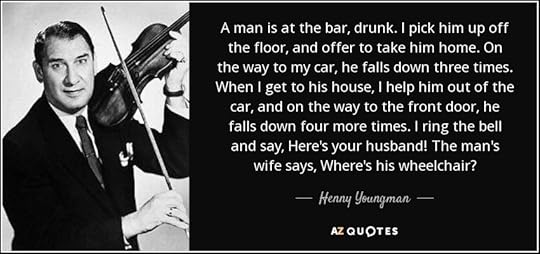
One night, the club’s regular comedian didn’t show up and the owner asked Youngman to fill in. He enjoyed it and thus began his long career as a stand-up comic.
Thereafter his violin was his stage prop, but he held it more often than he played it. He would deliver the jokes in a rapid-fire style, telling dozens in just 10 minutes. His wife was frequently the butt of his jokes, as were Jews.
Here are a few of his jokes and one-liners. I hope you enjoy them. Notice, they are ALL CLEAN. Comics in the past could make audiences laugh without dropping pervasive F-Bombs and other vulgar expressions.
“When I read about the evils of drinking, I gave up reading.”
A woman is staying at a hotel and calls down to the front desk. She complains that the bed in her room vibrates so much when the train passes on the nearby tracks that she is thrown out of bed. The hotel manager doesn’t believe her and goes to the room to investigate. Once he gets there he lays down on the bed. All of a sudden the woman’s husband walks in.
” What the hell are you doing here?”
“believe it or not, I’m waiting for a train”
A man says to another man, ‘Can you tell me how to get to Central Park?’
‘No.’
‘All right, I’ll mug you right here.’
I told the airline ticket lady, “Send one of my bags to New York, send one to LA, and send one to Miami.”
She told me, “We can’t do that!”
I told her, “Well you did it last week!”
I told the doctor I broke my leg in two places he said stop going to those places
I’ve been in love with the same woman for 41 years if my wife finds out she’ll kill me
A man walks into a library and asks I hope you don’t have a book on reverse psychology
There was a beautiful young woman banging on my hotel room door all night last night I finally let her out.
The psychiatrist says, “You’re nuts!”
The man says, “I want a second opinion!”
Psychiatrist says, “OK, you’re ugly, too!”
The CO says, “Are you crazy? You just joined the Israeli army, and you already want a 3 day pass? You must do something spectacular for that recognition!”
So the soldier comes back a day later in an Arab tank! The CO was so impressed, he asked, “How did you do it?”
“Well, I jumped in a tank, and went toward the border with the Arabs. I approached the border, and saw an Arab tank. I put my white flag up, the Arab tank put his white flag up. I said to the Arab soldier, ‘Do you want to get a 3 day pass?’ So we exchanged tanks!”
Husband: How could you lose $150 in the slot machines?
Wife: Well, you lost $15,000 at the crap tables.
Husband: Yeah but I know how to gamble.
After 30 years of marriage, people always ask, “What’s the secret of keeping the romance alive?” I always tell them…
We go to the same romantic restaurant every week, twice a week…I go on Tuesday. She goes on Fridays.
I’ve got all the money I’ll ever need if I die by four o’clock.
What’s the use of happiness? It can’t buy you money.
January 20, 2022
Thomas A. Edison’s Predictions About the Future
One of the more enduring activities of human beings has always been to imagine what the future will bring. We all do it, some more than others.
It’s what separates us from the rest of earth’s creatures, most of which are too consumed with daily survival to think past their last meal or their next one.
As authors of historical fiction, we invent characters and put them in various bygone eras. Then we create conflict for them to deal with, people to love and to hate, obstacles to overcome, a tragedy to rise above, and joyous moments to take pleasure in.
But how often do we have our characters speculate about what the world will look like in the future?
Not often, I am sure. And the reason is probably the same one I gave for earth’s “other” creatures. Our characters are often dealing with one conflict after another or just trying to survive. What the world will look like one hundred, two hundred, or three hundred years is simply not within their intellectual compass.
Authors who write science fiction and specifical books about time travel think about these things all the time. I do and I don’t even write science fiction (though I do enjoy a good time travel story when I find one).
So what has all of this got to do with historical novels? you may be asking.
I think having characters wonder about the future either via dialogue or in unspoken reflection adds another dimension to the people we create in eras such as the Dark Ages, the Middle Ages, the Enlightenment, or, in the case of my trilogy, the 19th Century and early 20th Century.
So how might we do that? Well, considering that truth is always stranger than fiction, you might examine predictions made about the future from some pretty famous and creative people.
Recently someone sent me a copy of a story that appeared in the 1911 edition of the now-defunct Miami Metropolis newspaper.
The story was an interview with none other than Thomas Edison in which America’s most famous inventor made some rather astounding predictions about the future. Some were quite accurate and some were, shall we say, a bit off target.
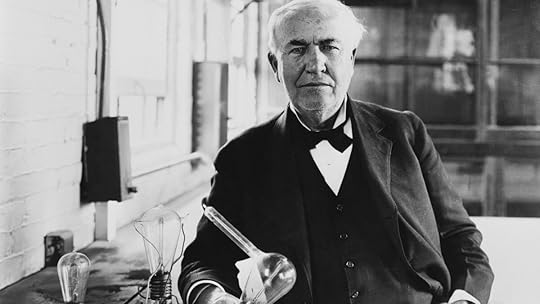 Thomas A. Edison
Thomas A. EdisonFor example, he rather amazingly predicts the e-book reader and at the same time predicts by 2011 we will be able to transmute metals and turn iron into gold. Ahem…
Here is that article in its entirety. Enjoy.
What will the world be a hundred years hence?
“None but a wizard dare raise the curtain and disclose the secrets of the future; and what wizard can do it with so sure a hand as Mr. Thomas Alva Edison, who has wrested so many secrets from jealous Nature? He alone of all men who live has the necessary courage and gift of foresight, and he has not shrunk from the venture.
Already, Mr. Edison tells us, the steam engine is emitting its last gasps. A century hence it will be as remote as antiquity as the lumbering coach of Tudor days, which took a week to travel from Yorkshire to London. In the year 2011 such railway trains as survive will be driven at incredible speed by electricity (which will also be the motive force of all the world’s machinery), generated by “hydraulic” wheels.
But the traveler of the future, says a writer in Answers, will largely scorn such earth crawling. He will fly through the air, swifter than any swallow, at a speed of two hundred miles an hour, in colossal machines, which will enable him to breakfast in London, transact business in Paris and eat his luncheon in Cheapside.
The house of the next century will be furnished from basement to attic with steel, at a sixth of the present cost — of steel so light that it will be as easy to move a sideboard as it is today to lift a drawing room chair. The baby of the twenty-first century will be rocked in a steel cradle; his father will sit in a steel chair at a steel dining table, and his mother’s boudoir will be sumptuously equipped with steel furnishings, converted by cunning varnishes to the semblance of rosewood, or mahogany, or any other wood her ladyship fancies.
Books of the coming century will all be printed leaves of nickel, so light to hold that the reader can enjoy a small library in a single volume. A book two inches thick will contain forty thousand pages, the equivalent of a hundred volumes; six inches in aggregate thickness, it would suffice for all the contents of the Encyclopedia Britannica. And each volume would weigh less than a pound.
Already Mr. Edison can produce a pound weight of these nickel leaves, more flexible than paper and ten times as durable, at a cost of five shillings. In a hundred years’ time the cost will probably be reduced to a tenth.
More amazing still, this American wizard sounds the death knell of gold as a precious metal. “Gold,” he says, “has even now but a few years to live. The day is near when bars of it will be as common and as cheap as bars of iron or blocks of steel.
“We are already on the verge of discovering the secret of transmuting metals, which are all substantially the same in matter, though combined in different proportions.”
Before long it will be an easy matter to convert a truckload of iron bars into as many bars of virgin gold.
In the magical days to come there is no reason why our great liners should not be of solid gold from stem to stern; why we should not ride in golden taxicabs, or substituted gold for steel in our drawing room suites. Only steel will be the more durable, and thus the cheaper in the long run.”
Golden ocean liners and cabs? I think we can all be thankful that Edison missed the boat (and the taxi) on that one.
January 19, 2022
A Piñata of Miscellanea. Go On, Take a Swing!
“And now for something completely different,” as they used to say on the old Monty Python show.
Duriing any given week I receive heaps of emails containing bits of wisdom, humor, anonymous information, and lots of weirdness.
Normally, I give these things a quick read and delete them.
Today, however, I thought I would share some of these epistles and dispatches with readers as a way for all of us to disengage from the steady stream of depressing news about COVID, inflation, world events, and the Washington swamp that overwhelms and engulfs us day after day.
So sit back, enjoy, learn, or laugh—or not, it’s your choice.
What the Donkey told the Tiger
The donkey told the tiger, “The grass is blue.”
The tiger replied, “No, the grass is green.”
The discussion became heated, and the two decided to submit the issue to arbitration, so they approached the lion.
As they approached the lion on his throne, the donkey started screaming: ′′Your Highness, isn’t it true that the grass is blue?”
The lion replied: “If you believe it is true, the grass is blue.”
The donkey rushed forward and continued: ′′The tiger disagrees with me, contradicts me and annoys me. Please punish him.”
The king then declared: ′′The tiger will be punished with 3 days of silence.”
The donkey jumped with joy and went on his way, content and repeating ′′The grass is blue, the grass is blue…”
The tiger asked the lion, “Your Majesty, why have you punished me, after all, the grass is green?”
The lion replied, ′′You’ve known and seen the grass is green.”
The tiger asked, ′′So why do you punish me?”
The lion replied, “That has nothing to do with the question of whether the grass is blue or green. The punishment is because it is degrading for a brave, intelligent creature like you to waste time arguing with an ass, and on top of that, you came and bothered me with that question just to validate something you already knew was true!”
The Moral of the Story?
The biggest waste of time is arguing with the fool and fanatic who doesn’t care about truth or reality, but only the victory of his beliefs and illusions. Never waste time on discussions that make no sense. There are people who, for all the evidence presented to them, do not have the ability to understand. Others are blinded by ego, hatred, and resentment and the only thing that they want is to be right even if they aren’t. When IGNORANCE SCREAMS, intelligence moves on.
Interesting Statistics from the Vietnam Memorial Wall.
There are 58,267 names now listed on that polished black wall, including those added in 2010.The names are arranged in the order in which they were taken from us by date and within each date the names are alphabetized. It is hard to believe it is 65 years since the first casualty.The first known casualty was Richard B. Fitzgibbon, of North Weymouth, Mass. Listed by the U.S. Department of Defense as having been killed on June 8, 1956. His name is listed on the Wall with that of his son, Marine Corps Lance Cpl. Richard B. Fitzgibbon III, who was killed on Sept. 7, 1965. There are three sets of fathers and sons on the Wall.39,996 on the Wall were just 22 or younger.8,283 were just 19 years old.The largest age group, 33,103 were 18 years old.12 soldiers on the Wall were 17 years old.5 soldiers on the Wall were 16 years old.One soldier, PFC Dan Bullock was 15 years old.997 soldiers were killed on their first day in Vietnam.1,448 soldiers were killed on their last day in Vietnam.31 sets of brothers are on the Wall.Thirty-one sets of parents lost two of their sons.54 soldiers attended Thomas Edison High School in Philadelphia. I wonder why so many from one school.8 Women are on the Wall, nursing the wounded.244 soldiers were awarded the Medal of Honor during the Vietnam War; 153 of them are on the Wall.Beallsville, Ohio with a population of 475 lost 6 of her sons.West Virginia had the highest casualty rate per capita in the nation. There are 711 West Virginians on the Wall.The Marines of Morenci – They led some of the scrappiest high school football and basketball teams that the little Arizona copper town of Morenci (pop. 5,058) had ever known and cheered. They enjoyed roaring beer busts. In quieter moments, they rode horses along the Coronado Trail, stalked deer in the Apache National Forest. And in the patriotic camaraderie typical of Morenci’s mining families, the nine graduates of Morenci High enlisted as a group in the Marine Corps. Their service began on Independence Day, 1966. Only 3 returned home.The Buddies of Midvale – LeRoy Tafoya, Jimmy Martinez, Tom Gonzales were all boyhood friends and lived on three consecutive streets in Midvale, Utah on Fifth, Sixth and Seventh avenues. They lived only a few yards apart. They played ball at the adjacent sandlot ball field. And they all went to Vietnam. In a span of 16 dark days in late 1967, all three would be killed. LeRoy was killed on Wednesday, Nov. 22, the fourth anniversary of John F. Kennedy’s assassination. Jimmy died less than 24 hours later on Thanksgiving Day. Tom was shot dead assaulting the enemy on Dec. 7, Pearl Harbor Remembrance Day.The most casualty deaths for a single day happened on January 31, 1968, with 245 deaths.The most casualty deaths for a single month was May 1968 – 2,415 casualties were incurred.
There are three sets of fathers and sons on the Wall.39,996 on the Wall were just 22 or younger.8,283 were just 19 years old.The largest age group, 33,103 were 18 years old.12 soldiers on the Wall were 17 years old.5 soldiers on the Wall were 16 years old.One soldier, PFC Dan Bullock was 15 years old.997 soldiers were killed on their first day in Vietnam.1,448 soldiers were killed on their last day in Vietnam.31 sets of brothers are on the Wall.Thirty-one sets of parents lost two of their sons.54 soldiers attended Thomas Edison High School in Philadelphia. I wonder why so many from one school.8 Women are on the Wall, nursing the wounded.244 soldiers were awarded the Medal of Honor during the Vietnam War; 153 of them are on the Wall.Beallsville, Ohio with a population of 475 lost 6 of her sons.West Virginia had the highest casualty rate per capita in the nation. There are 711 West Virginians on the Wall.The Marines of Morenci – They led some of the scrappiest high school football and basketball teams that the little Arizona copper town of Morenci (pop. 5,058) had ever known and cheered. They enjoyed roaring beer busts. In quieter moments, they rode horses along the Coronado Trail, stalked deer in the Apache National Forest. And in the patriotic camaraderie typical of Morenci’s mining families, the nine graduates of Morenci High enlisted as a group in the Marine Corps. Their service began on Independence Day, 1966. Only 3 returned home.The Buddies of Midvale – LeRoy Tafoya, Jimmy Martinez, Tom Gonzales were all boyhood friends and lived on three consecutive streets in Midvale, Utah on Fifth, Sixth and Seventh avenues. They lived only a few yards apart. They played ball at the adjacent sandlot ball field. And they all went to Vietnam. In a span of 16 dark days in late 1967, all three would be killed. LeRoy was killed on Wednesday, Nov. 22, the fourth anniversary of John F. Kennedy’s assassination. Jimmy died less than 24 hours later on Thanksgiving Day. Tom was shot dead assaulting the enemy on Dec. 7, Pearl Harbor Remembrance Day.The most casualty deaths for a single day happened on January 31, 1968, with 245 deaths.The most casualty deaths for a single month was May 1968 – 2,415 casualties were incurred.Most Americans who read this will only see the numbers that the Vietnam War created.
To those of us who survived the war, and to the families of those who did not, we see the faces, we feel the pain that these numbers created. We are, until we too pass away, haunted with these numbers, because they were our friends, fathers, husbands, wives, sons, and daughters. There are no noble wars, just noble warriors.
‘Golden Girls’ Quotes That Stand the Test of Time
Picture it: Miami, 1985… When The Golden Girls premiered on NBC in 1985, its premise seemed unlikely to resonate with younger viewers — four female senior-citizen housemates in Miami bicker and banter about everything from sex to menopause to marriage equality, all while wearing very ‘80s fashion (think: huge shoulder pads and copious amounts of hairspray).
Yet Golden Girls remains one of America’s most widely beloved sitcoms of all time. More than 35 years later, the series still has legions of loyal fans spanning all ages and backgrounds. It has won numerous Golden Globes and Emmys and has been broadcast around the world, even inspiring international versions in Russia, Spain, and the Philippines.
The series aired for seven seasons and featured four iconic actresses: Bea Arthur, who played sarcastic Dorothy Zbornak, a substitute teacher from Brooklyn prone to eye rolls and a quick temper; ue RMcLanahan, who played lusty Southern belle Blanche Devereaux; Betty White, who played sweet, ditzy Rose Nylund with way too many stories about life in St. Olaf, Minnesota; and Estelle Getty, who played Sophia Petrillo, Dorothy’s wise-cracking elderly Italian-American mother. Together, the four unlikely housemates pushed the envelope with their unmatched wit, unabashed sass, and undeniable love for one another.
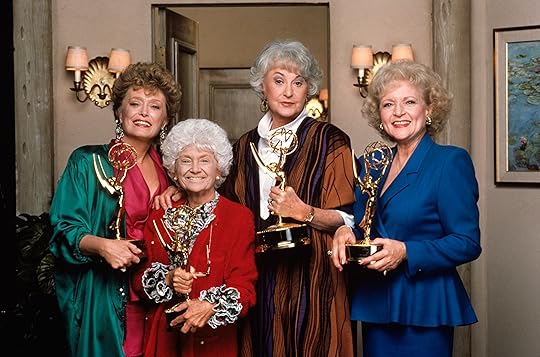
“I think everybody — including younger people — when they reach an age when they feel alienated, the thought of being alone and spending your life alone is terrifying,” show creator Susan Harris said of the show’s lasting appeal. “These women were at an age where they were alone and were likely to stay alone until they found each other. Then they constructed a family that really, really worked. They encouraged each other and had a life together.”
Below, are several memorable quotes from The Golden Girls that have stood the test of time. Get the cheesecake ready.
People waste their time pondering whether a glass is half empty or half full. Me, I just drink whatever’s in the glass— Sophia (Estelle Getty)My mother used to say: The older you get, the better you get. Unless you’re a banana— Rose (Betty White)No matter how bad things get, remember these sage words: You’re old, you sag, get over it— Sophia (Estelle Getty)You know what they say: You can lead a herring to water, but you have to walk really fast or he’ll die— Rose (Betty White)After 80, every year without a headstone is a milestone— Sophia (Estelle Getty)It is not easy being a mother. If it were easy, fathers would do it— Dorothy (Bea Arthur)You know my motto. Today could be the last day of your life— Sophia (Estelle Getty)The bottom line is, in life, sometimes good things happen, sometimes bad things happen. But honey, if you don’t take a chance, nothing happens—Blanche Devereaux (Rue McLanahan)Everyone wants someone to grow old with, and shouldn’t everyone have that chance?— Sophia (Estelle Getty)How come whenever my ship comes in it’s leaking?— Dorothy (Bea Arthur)Why do blessings wear disguises? If I were a blessing, I’d run around naked— Sophia (Estelle Getty)I eat raw cookie dough. And occasionally, I run through the sprinklers and don’t wear a bathing cap. And at Christmas, I’ve been known to put away more than one eggnog— Rose (Betty White)Look, you didn’t ask me for my opinion, but I’m old, so I’m giving it anyway— Sophia (Estelle Getty)U.S. Army SOS Recipe
For those who spent time in the military (for me it was the U.S. Army), you will appreciate this recipe. It’s for that old military standby called “SOS”—otherwise known as “Shit on a Shingle.”

I’m sure I ate gallons of the stuff during my four years of active duty, but I never thought about making it. I bet a lot of you haven’t either. Well here’s your chance. Read on and get those ingredients ready!
1-1/2 Lb. (24 oz.) of lean ground beef2 Tbsp. butter1 cup chopped onion3 Tbsp. flour2 Tbsp. granulated garlic (or garlic powder)2 Tbsp. soy sauce1 Tbsp. Worcestershire sauce2 cups milkSalt & Pepper to tasteBrown meat, drain. Back to the pan, add butter, and stir. Add chopped onions and cook until they are translucent. Add flour, stir and cook for two to three minutes. Add garlic, soy sauce, Worcestershire sauce and mix thoroughly. Add milk and stir until it thickens.
Serve over toast, biscuits, or eggs.
Lip-smacking scrummy! Right?
Useful Things I have done during the COVID Pandemic
Organized my collection of used bubble gum wrappersWatched reruns of Lawrence WelkListened to Pat Boone records backward to see if there were any satanic messagesLip-synced the entire Mozart opera “Die Zauberflöte“Perfected my recipe for ice cubesVisited Portland & Seattle to watch the riotsTook my pet turtle for long walks Searched for Bigfoot and the Loch Ness MonsterListened to every speech ever given by Hillary Clinton and Kamala Harris (also backward to see if there were any satanic messages. There Were!)Phrases of WisdomIf you’re too open-minded, your brains will fall out.Age is a very high price to pay for maturity.Going to church doesn’t make you a Christian any more than going to a garage makes you a mechanic.Artificial intelligence is no match for natural stupidity.If you must choose between two evils, pick the one you’ve never tried before.My idea of housework is to sweep the room with a glance.Not one shred of evidence supports the notion that life is serious.It is easier to get forgiveness than permission.For every action, there is an equal and opposite government program.If you look like your passport picture, you probably need the trip.Bills travel through the mail at twice the speed of checks.
Searched for Bigfoot and the Loch Ness MonsterListened to every speech ever given by Hillary Clinton and Kamala Harris (also backward to see if there were any satanic messages. There Were!)Phrases of WisdomIf you’re too open-minded, your brains will fall out.Age is a very high price to pay for maturity.Going to church doesn’t make you a Christian any more than going to a garage makes you a mechanic.Artificial intelligence is no match for natural stupidity.If you must choose between two evils, pick the one you’ve never tried before.My idea of housework is to sweep the room with a glance.Not one shred of evidence supports the notion that life is serious.It is easier to get forgiveness than permission.For every action, there is an equal and opposite government program.If you look like your passport picture, you probably need the trip.Bills travel through the mail at twice the speed of checks.A conscience is what hurts when all your other parts feel so good.Eat well, stay fit, die anyway.Men are from earth. Women are from earth. Deal with it.No husband has ever been shot while doing the dishes.A balanced diet is a Twinkie in each hand.Middle age is when the broadness of the mind and narrowness of the waist change places.Opportunities always look bigger going than coming.Junk is something you’ve kept for years and throw away three weeks before you need it.There is always one more imbecile than you counted on.Experience is a wonderful thing. It enables you to recognize a mistake when you make it again.By the time you can make ends meet, they move the ends.Thou shalt not weigh more than thy refrigerator.Someone who thinks logically provides a nice contrast to the real world.Blessed are they who can laugh at themselves for they shall never cease to be amused.
And there you have it. Some wisdom. Some laughs. And some useful information—especially that SOS recipe!
I hope you enjoyed it! Don’t worry, I will do this again once I accumulate enough material. Believe me, there is plenty of it!
In the meantime, remember what the Danish storyteller & author Hans Christian Andersen said: “Enjoy life. There’s plenty of time to be dead.”

